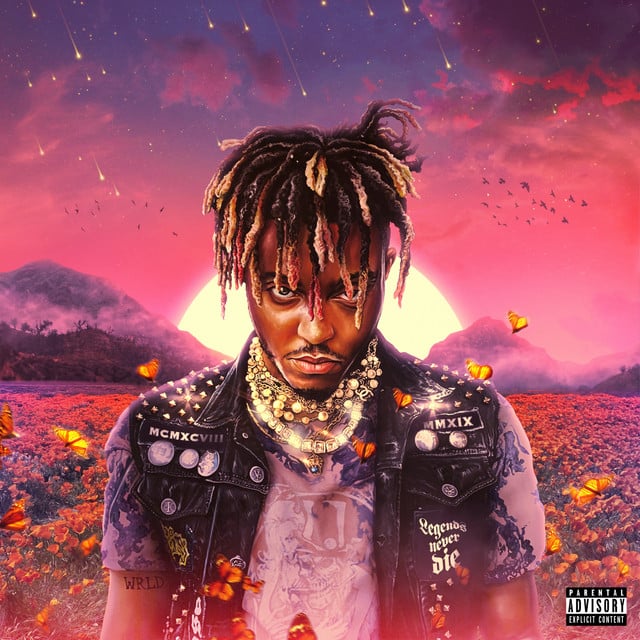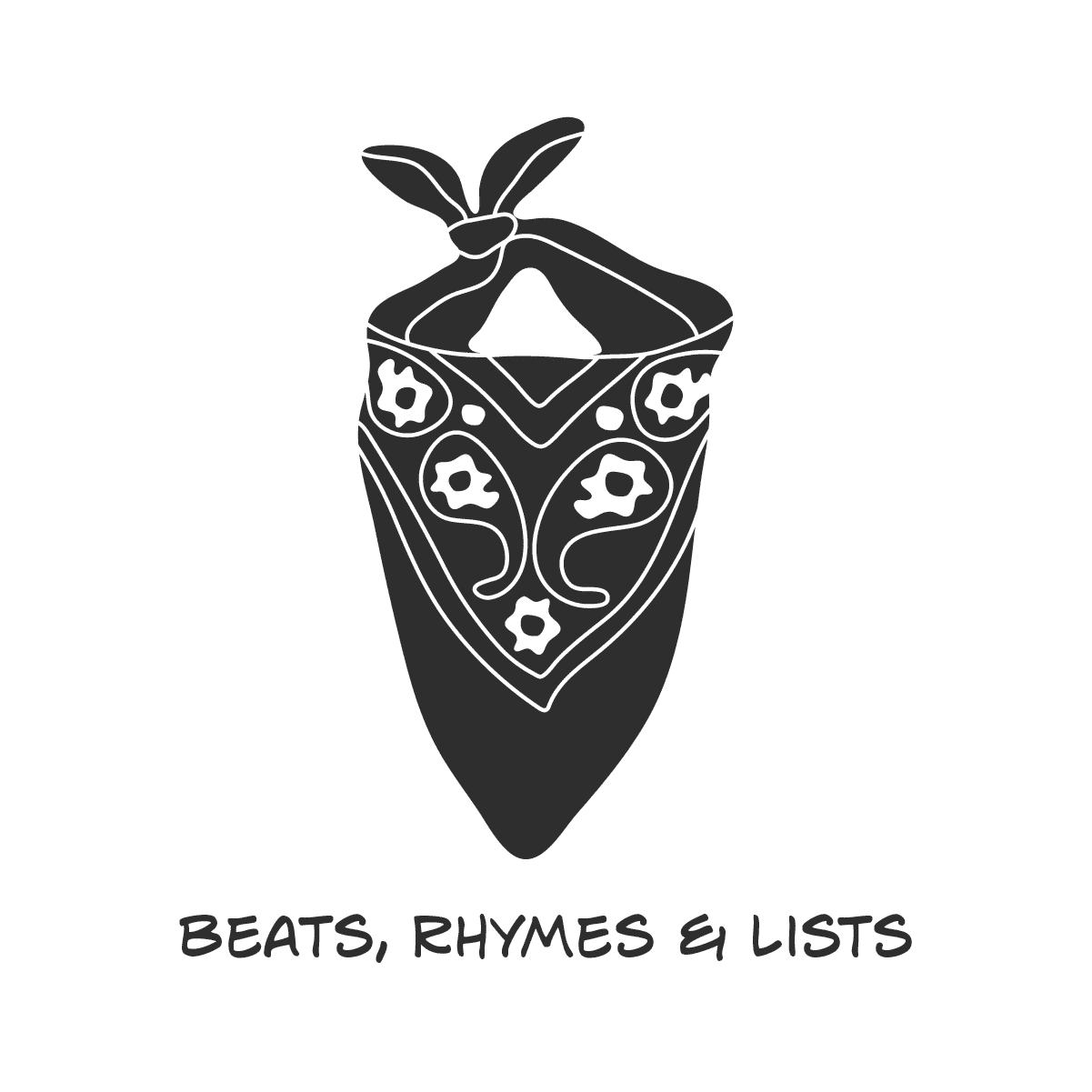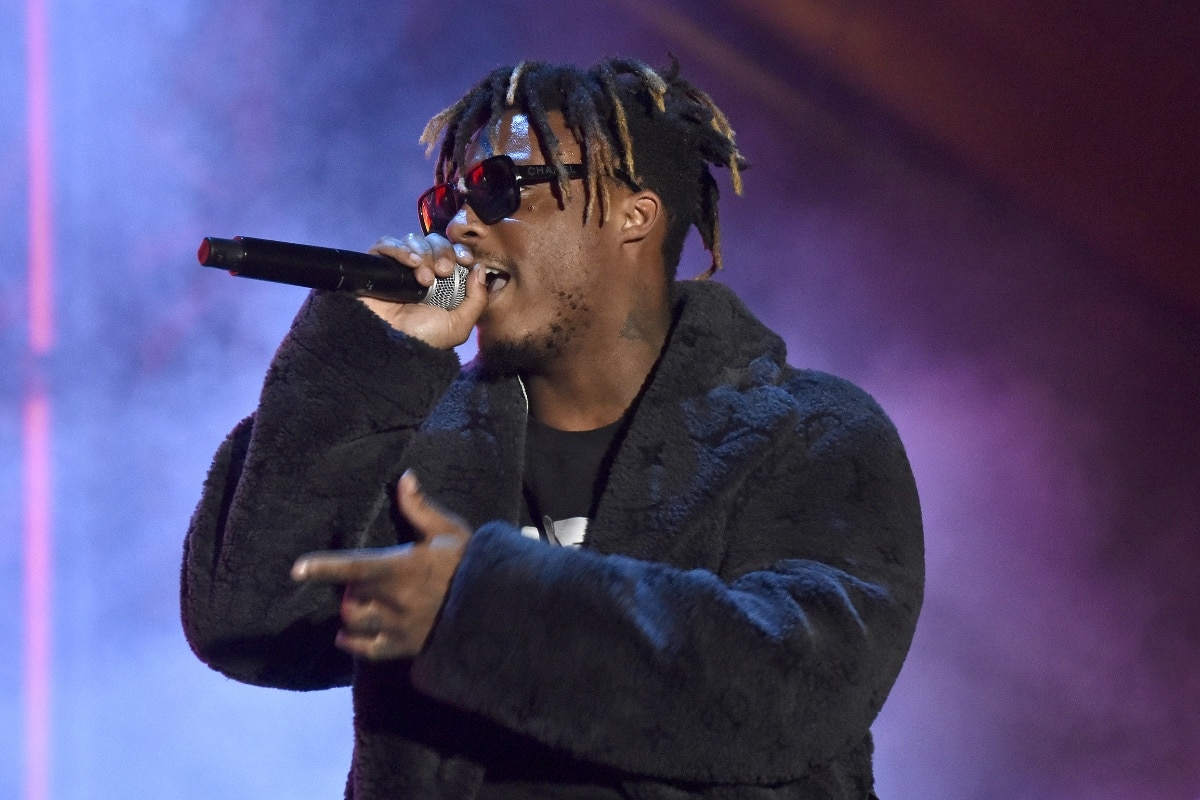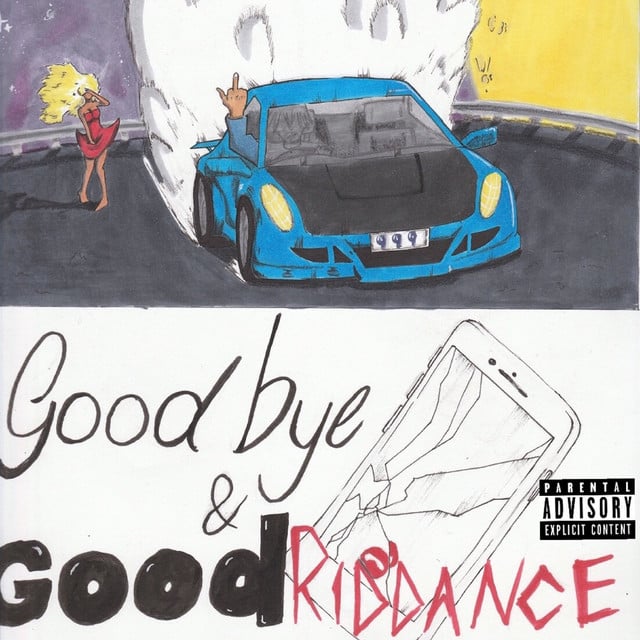Released: 2020
Label: Grade A Productions/Interscope Records
Featuring: The Weeknd, Trippie Redd, Marshmello, The Kid LAROI, Polo G, Halsey
In the labyrinthine landscape of hip-hop, few artists personify vulnerability and raw emotion as eloquently as Juice WRLD. With his posthumous album, ‘Legends Never Die’, the late emcee cements his enduring legacy in hip-hop’s pantheon, providing an intimate glimpse into his battle with inner demons and his unflinching look at life and death. The album raises a mirror to societal ills and personal tribulations, unveiling the naked truth about the human condition.
Throughout ‘Legends Never Die’, Juice WRLD utilized his cathartic lyricism as an alchemist would, transmuting pain into resonating artistry. The album is a sonic roller coaster ride of emotions, transporting the listener from cryptic abysses (‘Conversations’, ‘Titanic’) through his hopeful affirmations of resilience (‘Righteous’, ‘Blood On My Jeans’). Notably, tracks like ‘Smile’ and ‘Life’s A Mess’, featuring The Weeknd and Halsey respectively, amplify the album’s narrative, further emphasizing the themes of loss and resilience.
The late wordsmith’s album is a testament to his poetic prowess, and his raw expression resonates with a generation grappling with similar issues. So let’s get into it. From ‘Anxiety – Intro’ to ‘Juice WRLD Speaks From Heaven – Outro’, here are the lyrics, dissected, on ‘Legends Never Die’ by Juice WRLD.
1. Anxiety – Intro
He acknowledges the blessings in his life, but also the ghosts that haunt him, revealing far more pressing concerns than heartbreak. Juice preaches about battling anxiety and substance abuse, suggesting music as his medium to promote change. He views himself as a divine agent of change, using his music as a vehicle to speak to his generation on issues that others shy away from. And when Juice imparts the message, “You can do anything you put your mind to,” it’s more than motivational talk. It’s the embodiment of a modern-day hip-hop prophet who walked the same treacherous path he warns his followers about, embodying a gritty reality beneath the veneer of success.
2. Conversations
He captures the concept of wrestling with his demons, visualizing a dialogue with the devil himself. It’s not just a track, it’s an intimate peep into the rapper’s troubled psyche. His repeated refrain about not being “up for conversations” feels like a desperate plea for solitude amid the chaotic battles within him. The track is laced with stark admissions of drug use, laying bare the extent of his reliance on substances to cope. But here’s where Juice WRLD shines—his unabashed honesty and emotive delivery transform his pain into resonant art. Even his references to luxury brands underline the hollowness of material success in the face of mental turmoil.
3. Titanic
Packed heavy, his lyrics reveal a struggle to keep afloat amid the turbulent seas of fame and fortune. Despite his success symbolized by ‘a new house’ and being a ‘young rich nigga,’ he’s burdened by the skeletons in his closet that he strives to forget. The track encapsulates his struggle with his darker side that shows face ‘in the midnight air.’ His references to the ill-fated ship, Titanic, underscore the sense of impending doom, the façade of invincibility that eventually leads to downfall, analogous to his own life and career.
4. Bad Energy
The lyrics reveal Juice’s internal struggle, portraying an individual on a quest to drain out bad energy while grappling with dependency and inner turmoil. He confesses to using substances as an escape from adversity, exploring themes of mental health and the toll it takes. The journey from the shiny pearls to the stab wounds in the chest paints a vivid picture of an artist oscillating between the highs of his success and the lows of his personal afflictions.
5. Righteous
In true Juice fashion, the track ain’t just about dope bars, but a cry straight from the heart, laid over a chill trap beat. His Gucci suit might be all white, but his psyche’s comforted by hues of red and black. In this haunting anthem, codeine doesn’t just runneth over on his nightstand, it floods his existence, casting a long shadow over his tormented soul and icy heart. Righteous ain’t just a song, it’s Juice’s testament to trying to outrun his demons, but also a raw look at the medical crutch he leaned on to cope with the ravages of fame and personal strife.
6. Blood On My Jeans
He addresses his struggle with substance abuse, using his romantic relationship as a symbol for his dependency on drugs. The song reflects his quintessential melodic rap style, adorned with the trap beats. The lyrics manifest his raw honesty, admitting to his drug issues and speaking to his attempts to quit. It’s a soul-rendering documentation of a young artist crusading against his Achilles’ heel. In the end, Juice WRLD demonstrates that life might be stained by adversity, like blood on jeans, but that doesn’t stop us from moving forward.
7. Smile (with The Weeknd)
He addresses the duality of wanting the best for a loved one, even if it means letting them go. The ‘smile’ symbolically represents his desire to see happiness in others, even in his absence. Paranoia, dependency, and longing break the surface as recurring motifs, painting a profound narrative of his internal struggle. This introspective track combines Juice’s signature ‘emo rap’ with Weeknd’s haunting vocals, creating a poignant sonic landscape. With ‘Smile’, Juice WRLD once again demonstrates his knack for turning tumultuous life experiences into relatable, ear-catching narratives.
8. Tell Me U Luv Me (with Trippie Redd)
Ambushed by a toxic mix of love, dependency, and substance abuse, Juice pleads for affirmation and stability. He’s caught up in a whirlwind of addiction and emotional turmoil, unable to differentiate between the pleasures of a lover’s company and the deceptive comfort of drugs. He’s teetering on the precipice of self-destruction, pleading for a lifeline in the recurring refrain of “Tell me you love me”. The track epitomizes Juice’s ability to translate raw, uncut feelings into melodic verses, providing a window into his battle with personal demons, blending a chilling cocktail of despair and yearning.
9. Hate The Other Side (with Marshmello & The Kid Laroi)
From the heart of Chicago, he paints a vivid picture of his struggle with a street-hardened brush. His lyrics speak to the harsh realities of gang life and the echoing trauma of lost loved ones, a subject close to Juice’s heart. Throughout the track, Juice WRLD emphasizes his loyalty to his crew and his ‘riding-or-dying’ ethos – a testament to his unwavering allegiance. Yet there’s a relentless pursuit of financial stability echoing through his verses, reflecting a reality where money is synonymous with survival. In a haunting refrain, he admits to ‘hating the other side’, a poignant peek into the deeply ingrained divisions fueling his world.
10. Get Through It – Interlude
Juice WRLD, a poet of the people, uses this track to give a voice to individual struggles, emphasizing that resilience is universal – a theme that harks back to classic hip-hop narratives of struggle and triumph. This piece stands as a pinnacle moment in the record, encapsulating his authenticity and ultimately laying the groundwork for the more intensive emotional explorations in the tracks which follow.
11. Life’s A Mess (feat. Halsey)
He lays out his pain without sugar-coating, crafting a vivid portrayal of a soul yearning for real love and self-acceptance. Together with Halsey, they explore the raw edges of love, heartbreak, and the duality of life’s ups and downs. It’s real talk, no gimmicks – the antithesis of many bubblegum pop tracks. Juice WRLD’s lyrical prowess is at the forefront here, weaving powerful metaphors and relatable sentiments that echo long after the song ends. It’s a sonic reflection of a turbulent life filled with trials and tribulations, yet one that clings onto hope and the healing power of genuine love.
12. Come & Go (with Marshmello)
Juice straight spits about his struggle with imperfection and the pressures of living up to expectations, praying for personal growth, and acknowledging his self-destructive tendencies. But the essence lies in his yearning not to ruin the ephemeral nature of love. Partnering with Marshmello brings out the rock-infused elements of Juice’s sound, the beat switch-ups and the screaming electric guitars almost mirroring the emotional volatility. It’s a track firmly rooted in hip-hop but reaches out to the angst of punk rock, a testament to Juice’s dexterity as an artist.
13. I Want It
With verses drenched in a raw desire for connection amidst the isolation of fame, his plea – to stick around, to find solace in companionship – pierces through the hip-hop prowess. His characteristic blend of evocative emotionality and melodic momentum intensifies the track’s introspective depth, unraveling tales of trust issues, fleeting romance, and the escapist lure of luxury. Dior and Rick Owens aren’t merely fashion statements here, but metaphoric observations on the ephemeral nature of glamour in comparison to the enduring battles within. This track showcases Juice WRLD’s lyrical genius and his evolved understanding of love and life’s transience.
14. Fighting Demons
The track delves into the pain beneath the fame, with Juice discussing his inner battles and the lurking dread of untimely demise. He probes the artificial satisfaction that wealth brings and queries the joy it’s hyped to provide. His demons are metaphorical and tangible, with his success seemingly inciting more spiritual combat. “Fighting Demons” is an honest mirror reflecting the paradoxical reality of stardom and a testament to Juice’s ability to vocalize the mental health struggles that many dismiss or veil.
15. Wishing Well
Clad in his heart on his sleeve, Juice spits verses like he’s on a therapist’s couch, unloading the heavy burdens of depression and drug dependency. The lyrics are intense and reflective, painting a vivid picture of his internal battles. References like “Drugs killing me softly, Lauryn Hill” give it a realness that cuts deep while nodding at hip-hop’s rich tapestry. It’s a stark reminder that the glitz and glamour of the rap game often mask a darker reality. This track is a poignant testament of Juice’s struggle, making it a standout in his oeuvre.
16. Screw Juice
The track is a typical Juice WRLD joint, full of gloomy metaphors of pain and suffering, layered over a haunting melody. It vividly portrays a man at the crossroads, wrestling with the demons of fame, love, and substance abuse. His lyrics resonate with a dark, introspective edge, weaving stories of heartbreak and dependency with heartbreaking clarity. The chorus underscores a narrative of perseverance and hope amidst despair. Through its visceral honesty and relentless introspection, “Screw Juice” captures the essence of Juice WRLD’s complex emotions and struggles, offering an unfiltered view into the heart of an artist grappling with personal trauma and vulnerability.
17. Up Up And Away
The track is a testament to the rapper’s uncanny ability to weave his battles with addiction and mental health into a sonic tapestry. The metaphor of ‘the walls in my brain’ caving in and his confession of trying to numb pain with fast living paints a raw, unfiltered picture of his emotional landscape. With lyrical mentions of luxury brands like Prada, he depicts a double-edged sword of fame – one that offers lavish highs but also fuels personal turmoil. Meanwhile, his use of oceanic imagery cements the cruel irony of success: Despite being on top of the ‘waves,’ he’s still drowning in his demons.
18. The Man, The Myth, The Legend – Interlude
Different voices chime in, celebrating Juice’s prowess and recognizing his place in the hip-hop pantheon. They equate him to the likes of Biggie and Pac and echo the rampant rawness of early Lil Wayne. That 2006 to 2009 Weezy – fierce, free, and freestyling. These testimonials underscore Juice’s unworldly ability to finesse freestyles into chart-topping hits, not just once, but time and time again. The discussion about his promising yet short-lived career on this track is a poignant reminder of a colossal talent interrupted that will forever leave hip-hop wonderin’, “What could’ve been?”
19. Stay High
He uses stark imagery – from references to lean, ambulances, and the cold heart of a superhero – to paint an unfiltered picture of his suffering. The refrain ‘Too low in my life, gotta stay high’ becomes an honest confession of his coping mechanism—finding solace in substances to numb the pain. His girlfriend’s concern, the loss of real friends, and his wealth paradoxically causing him to drown all serve as harrowing depictions of a life in turmoil. Yet, the lyric’s rawness, combined with his emotive delivery, validate Juice’s experiences and shed light on the darker side of fame and success within the hip-hop realm.
20. Can’t Die
Throughout the track, Juice grapples with loss, fame, and the reality of death. Being one of the richest people alive, but deeply unsettled by those missing from his life, the track is a chilling yet cathartic confession from the late rapper’s soul. It’s a heavy reminder of his untimely passing and the echoes of the conversations surrounding addiction and mental health in the rap industry. At its core, “Can’t Die” is a powerful piece of art from an artist gone far too soon, giving us profound insight into his complex world.
21. Man Of The Year
Here, Juice acknowledges his fame (“Man of the year, still got problems”) and how he’s used self-medication (“Sippin’ codeine like it’s beer”) to cope. Amid scenes of London and faux cheer (“Screaming Cheers”), the lyrics underscore Juice’s struggles with substance abuse and mental health. The duality of life’s ups and downs is poignantly referenced, capturing the reality of dealing with fame, fortune and adversity. This layered narrative adds a profound depth, transcending the party-track exterior to reveal his inner torment, ultimately making it a testament to Juice’s ability to give his demons a danceable beat.
22. Juice WRLD Speaks From Heaven – Outro
Juice WRLD’s cryptic Instagram Live reference is not just about the digital platform; it’s a bittersweet metaphor of communicating from the great beyond. He’s boolin’ (chillin’) in paradise, expressing sincere love for his fans, stayin’ true with that ‘999’ tag – his trademark symbology for turning life’s negatives into positives. It’s a devastating endnote to ‘Legends Never Die’, symbolizing Juice WRLD’s final farewell, but also his transcendence into an immortal figure within the hip-hop landscape where the party, indeed, never ends.









